8 (Mile) is Enough
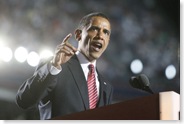 Did anybody else notice that Barack Obama borrowed some of his speech writing skills from Eminem?
Did anybody else notice that Barack Obama borrowed some of his speech writing skills from Eminem?
I pulled up the movie's plot outline from Wikipedia this morning and the similarities are uncanny. I'm predicting "Lose Yourself" will be played following rousing speeches yet to come.
"The climax of the movie takes place at the battle. Rabbit's friends hype him throughout the film as an incredible rapper, but until this point the film only shows snippets of his skills. The tournament has three rounds, and in each of them Rabbit faces a member of the "Leaders of the Free World", a group that feuds with Rabbit and his friends throughout the film. Rabbit wins both of the first two rounds with progressively more impressive freestyle raps."
"In the last round, he is paired against Papa Doc, the tournament's most feared battler and Jimmy's main antagonist throughout the 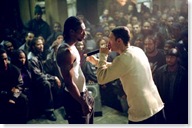 storyline. Rabbit is aware that Doc knows all his weak points, so he decides to address them preemptively with his freestyle. Rabbit acknowledges without shame his white trash roots and the various humiliations the Free World clique have inflicted on him. He then uses the difficult life he's had as a springboard to reveal the truth about Papa Doc: despite passing himself off as a thug, he has a privileged background. Doc, whose real name is Clarence, attended Cranbrook, a private school located in upper class Bloomfield Hills. Rabbit makes a reference to Shook Ones Pt. II, the beat that the DJ is spinning, by calling Papa Doc a 'halfway crook,' which sends the crowd into a frenzy. Doc is left with nothing to say in rebuttal, drops the mic, and Rabbit takes the title."
storyline. Rabbit is aware that Doc knows all his weak points, so he decides to address them preemptively with his freestyle. Rabbit acknowledges without shame his white trash roots and the various humiliations the Free World clique have inflicted on him. He then uses the difficult life he's had as a springboard to reveal the truth about Papa Doc: despite passing himself off as a thug, he has a privileged background. Doc, whose real name is Clarence, attended Cranbrook, a private school located in upper class Bloomfield Hills. Rabbit makes a reference to Shook Ones Pt. II, the beat that the DJ is spinning, by calling Papa Doc a 'halfway crook,' which sends the crowd into a frenzy. Doc is left with nothing to say in rebuttal, drops the mic, and Rabbit takes the title."


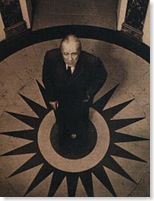
 "I can hardly conceive how limited my perception would be without the books I have been privileged to read, how superficial my understanding of others, how undeveloped my sympathies. And I mean here, especially, without fiction, which puts flesh and blood on, and the soul and feeling in, other human beings. Precisely because if its appeal to my imagination, which Webster's dictionary defines as 'the act or power of forming a mental image of something not present to the senses or never before wholly perceived in reality,' in fiction I come to know and understand people I may not have met otherwise. And thus I am persuaded to a more compassionate, generous, and loving response in my life beyond books."
"I can hardly conceive how limited my perception would be without the books I have been privileged to read, how superficial my understanding of others, how undeveloped my sympathies. And I mean here, especially, without fiction, which puts flesh and blood on, and the soul and feeling in, other human beings. Precisely because if its appeal to my imagination, which Webster's dictionary defines as 'the act or power of forming a mental image of something not present to the senses or never before wholly perceived in reality,' in fiction I come to know and understand people I may not have met otherwise. And thus I am persuaded to a more compassionate, generous, and loving response in my life beyond books." It's the birthday of the boy who inspired the Winnie-the-Pooh books:
It's the birthday of the boy who inspired the Winnie-the-Pooh books:  Before Christopher Robin started school, he loved to help his father write his stories, but at school his classmates mocked him and recited verses about him from his father's books. Christopher grew to resent his father for making it impossible for him to have a normal life. He went off to the army, and when he returned he felt even more trapped by the fame of being a character in Winnie-the-Pooh, so he decided to leave London and open a bookshop in Dartmouth with his wife, although it attracted lots of customers looking to meet the original Christopher Robin. Eventually, he published three memoirs:
Before Christopher Robin started school, he loved to help his father write his stories, but at school his classmates mocked him and recited verses about him from his father's books. Christopher grew to resent his father for making it impossible for him to have a normal life. He went off to the army, and when he returned he felt even more trapped by the fame of being a character in Winnie-the-Pooh, so he decided to leave London and open a bookshop in Dartmouth with his wife, although it attracted lots of customers looking to meet the original Christopher Robin. Eventually, he published three memoirs: 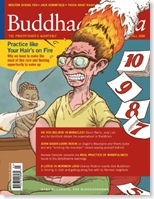
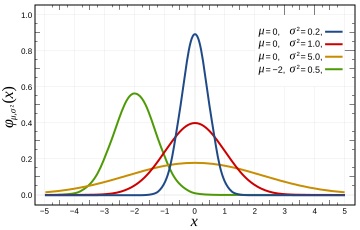


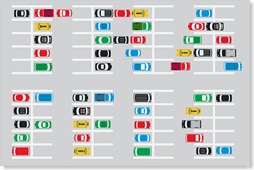
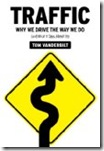 Compounding this vehicular hubris is the fact that most of the driving we do appears to be safer than it is. Driving rarely commands 100 percent of our attention, and so we feel comfortable multitasking: talking on the phone, unfolding a map, taking in the Barca-Lounger on the road’s shoulder. Vanderbilt cites a statistic that nearly 80 percent of crashes involve drivers not paying attention for up to three seconds. Thus the places that seem the most dangerous — narrow roads, hairpin turns — are rarely where people mess up. “Most crashes,” Vanderbilt writes, “happen on dry roads, on clear, sunny days, to sober drivers.” For this reason, roads that could be straight are often constructed with curves — simply to keep drivers on the ball.
Compounding this vehicular hubris is the fact that most of the driving we do appears to be safer than it is. Driving rarely commands 100 percent of our attention, and so we feel comfortable multitasking: talking on the phone, unfolding a map, taking in the Barca-Lounger on the road’s shoulder. Vanderbilt cites a statistic that nearly 80 percent of crashes involve drivers not paying attention for up to three seconds. Thus the places that seem the most dangerous — narrow roads, hairpin turns — are rarely where people mess up. “Most crashes,” Vanderbilt writes, “happen on dry roads, on clear, sunny days, to sober drivers.” For this reason, roads that could be straight are often constructed with curves — simply to keep drivers on the ball.
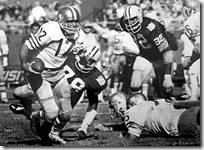 "At times, and with increasing frequency now, I experience a kind of clarity that I've never seen adequately described in a football story. Sometimes, for example, time seems to slow way down, in an uncanny way, as if everyone were moving in slow motion. It seems as if I have all the time in the world to watch the receivers run their patterns, and yet I know the defensive line is coming at me just as fast as ever. I know perfectly well how hard and fast those guys are coming and yet the whole thing seems like a movie or a dance in slow motion. It's beautiful."
"At times, and with increasing frequency now, I experience a kind of clarity that I've never seen adequately described in a football story. Sometimes, for example, time seems to slow way down, in an uncanny way, as if everyone were moving in slow motion. It seems as if I have all the time in the world to watch the receivers run their patterns, and yet I know the defensive line is coming at me just as fast as ever. I know perfectly well how hard and fast those guys are coming and yet the whole thing seems like a movie or a dance in slow motion. It's beautiful." It’s no secret. White people want to be writers. Why wouldn’t they? Work 10 hours a week from a country house in Maine or England. Get called a genius by other white people, and maybe get your book made into a film.
It’s no secret. White people want to be writers. Why wouldn’t they? Work 10 hours a week from a country house in Maine or England. Get called a genius by other white people, and maybe get your book made into a film.
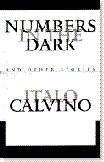
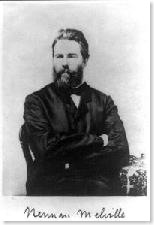
 But it was a flop. Readers didn't like it. His American publisher only printed 3,000 copies, and most of those never even sold; in 1853, a warehouse fire destroyed the plates and the unsold books, and the publisher refused to reset the book or compensate Melville.
But it was a flop. Readers didn't like it. His American publisher only printed 3,000 copies, and most of those never even sold; in 1853, a warehouse fire destroyed the plates and the unsold books, and the publisher refused to reset the book or compensate Melville. 



